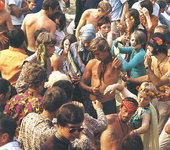Sexual revolution was triggered by antibiotics
Historian Andrew Francis of Emory University (USA) noticed an interesting pattern - sexual revolution in the United States and Western Europe in the twentieth century began at the same time when antibiotics treatment became commonplace. Antibiotics ended the threat of syphilis, the most feared STD.

Any drug has side effects that every developer tries to predict to include them in the drug's instruction for use. However, all side effects are not always possible to predict, especially if they occur on a global scale.
Could Alexander Fleming, who succeeded in isolating the first antibiotic - penicillin, predict that the introduction of the drug into mass use would cause a sexual revolution in the U.S. and the countries of Western Europe in the second half of the twentieth century? Not likely. Yet, it happened, and the widespread use of penicillin did away with many STDs, which, in turn, made extramarital sex less risky. But let's start from the beginning.
Many researchers believe that in all cultures the taboo on extramarital affairs is conditioned by the fear of the spread of STDs. Indeed, if everyone in some small tribe starts cheating, the infection my quickly spread throughout the community. While some of these diseases do not kill people, for some time the entire tribe would have to treat it, and during this period the tribe can be crowded out from rich hunting grounds by healthier neighbors.
Over time, negative attitudes to extramarital affairs became a fact of public and religious morals as people have not been able to win the fight against STDs until the twentieth century. This situation lasted for a long time, although there were still plenty of people willing to break the taboo. Interestingly, another wave of "Puritanism" emerged in the 19th century, the time when such horrible disease like syphilis was particularly prevalent around the world. In the last century, the disease continued to kill people. According to statistics, the last peak of deaths from syphilis in the United States was in 1939, when the disease killed about 20,000 people.
A historian Andrew Francis of Emory University (USA) drew attention to an interesting pattern. Penicillin was discovered in 1928, but in clinical practice its use started only thirteen years later. During the Second World War the issue of STDs was particularly acute, because these diseases could undermine combat effectiveness of any army. Not surprisingly, generals were eager to protect their soldiers from diseases, including sexually transmitted ones, and therefore the study of antibiotics, including their impact on the agents of "bad diseases," was ramped up.
That's where it was discovered that Fleming's penicillin cured a great majority of sexually transmitted diseases. In particular, with its intensive use from 1947 to 1957 deaths from syphilis in the U.S. declined by 75 percent, and incidence - by 95 percent. Gonorrhea, trichomoniasis and other STDs were cured with a single injection (at the time it was not know that antibiotics may cause bacterial imbalance and that pathogens eventually get used to them). That is, the drug has become a panacea against all sexually transmitted diseases, and people realized that these were not threatening.
This is when, according to Mr. Francis, sexual revolution has begun (some mistakenly believe that it happened in early 1960s, but the research of many experts indicates that it was not the beginning but the peak). The scientist gained access to the documents of 1930-1970-ies on health services at the federal and state levels and noticed three indicators of sexual behavior: the ratio of illegitimate births, teenage pregnancies and gonorrhea. The results showed a sharp increase in all three indicators in late 1950s, that is, after penicillin has won the battle with syphilis.
In the late 1970s the so-called "sexual counter-revolution" began, when extra-marital sex once again acquired a negative connotation in the public consciousness. However, this was due to proliferation of another terrible disease - AIDS that cannot be cured with antibiotics. However, Mr. Francis noted that currently "revolutionary tendencies" in the sexual sphere are regaining their position, since the development of antiretroviral therapy made people less worried about HIV and more likely to engage in a risky sexual behavior.
Anton Evseyev
Pravda.Ru
Subscribe to Pravda.Ru Telegram channel, Facebook, RSS!

